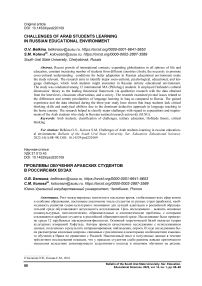Challenges of Arab students learning in Russian educational environment
Автор: Belkina O.V., Kolova S.M.
Рубрика: Интернационализация образования. Образование в странах мира
Статья в выпуске: 1 т.14, 2022 года.
Бесплатный доступ
Recent growth of international contacts, expanding globalization in all spheres of life and education, constant increasing number of students from different countries (Arab), the necessity to promote cross-cultural understanding conditions for better adaptation in Russian educational environment make the study relevant. The research aims to identify major socio-cultural, psychological, educational, and language challenges, which Arab students might encounter in Russian tertiary educational environment. The study was conducted among 12 international MA (Philology) students. It employed Hofstede's cultural dimensions’ theory as the leading theoretical framework via qualitative research with the data obtained from the interviews, classroom observations, and a survey. The research examined pivotal issues related to the differences and certain peculiarities of language learning in Iraq as compared to Russia. The gained experience and the data obtained during the three-year study have shown that Iraqi students lack critical thinking skills and analytical abilities due to the dominant deductive approach in language teaching in the home country. The research helped to classify major challenges with regard to expectations and requirements of the Arab students who study in Russian national research university (SUSU).
Arab students, classification of challenges, tertiary education, hofstede theory, critical thinking
Короткий адрес: https://sciup.org/147236487
IDR: 147236487 | DOI: 10.14529/ped220109
Список литературы Challenges of Arab students learning in Russian educational environment
- Abukhattala I. What Arab Students Say about Their Linguistic and Educational Experience in Canadian Universities. International Education Studies, 2013, no. 6 (8), pp. 31-37. DOI: 10.5539/ies.v6n8p31
- Al Khaiyali T., Nuseir N., Kharruba R. Study of Cultural Challenges Faced by the Arab Learners of English in the United States of America. International Journal of English Language & Translation Studies, 2018, no. 6 (2), pp. 36-40.
- Arefyev A.L. [Export of Russian Educational Services: Statistical Collection]. Ministry of Science and Higher Education of the Russian Federation. Available at: https://drive.google.com/file/d/ 1bxm8wrEFQDSb7K0Y_I1eEjyl040H8uKx/view (accessed 8.01.2022).
- Asgar Ali Ansari. Teaching of English to Arab Students: Problems and Remedies. International Research Journal, 2012, no. 3 (6), pp. 519-524.
- Banks J.A., Banks C.A. Multicultural Education: Historical Development Dimensions and Practice. Handbook of Research on Multicultural Education. 2nd ed. San Francisco, CA, Jossey-Bass Publ., 2004, Ch. 1 pp. 3-29.
- Banks J.A., Banks Cherry A. McGee. Multicultural Education: Issues and Perspectives. Hobo-ken, N.J., Wiley, 2007. 491 p.
- Cumming A. Fostering Writing Expertise in ESL Composition Instruction: Modeling and Evaluation. Academic Writing in a Second Language: Essays on Research and Pedagogy. Norwood, NJ. Ablex Publishing Corporation Publ., 1995, Ch. 16, pp. 375-397.
- Gollnick D., Chinn P. Multicultural Education in a Pluralistic Society Exploring Diversity. Prentice Hall Publ., 2006. 404 p.
- Guryanov I.O., Rakhimova A.E., Guzman M.C. Socio-Cultural Competence in Teaching Foreign Languages. International Journal of Higher Education, 2019, no. 7 (8), pp. 116-120. DOI: 10.5430/ijhe.v8n7p116
- Halic O., Greenberg K., Paulus T. Language and Academic Identity: A Study of the Experiences of Non-Native English Speaking International Students. International Education, 2009, no. 38 (2), pp. 73-93.
- Hofstede G. Dimensionalizing Cultures: The Hofstede Model in Context. Online Readings in Psychology and Culture, 2011, 2 (1). Available at: https://scholarworks.gvsu.edu/orpc/vol2/iss1/87 (accessed 7.01.2022). DOI: 10.9707/2307-0919.1014
- Murray D.E., Christison M. What English Language Teachers Need to Know? New York, Routledge Publ., 2019. 312 p.
- Rabab'ah G. Communication Problems Facing Arab Learners of English. Language Learning Journal, 2003, no. 3 (1). Available at: https://www.researchgate.net/publication/228380118 (accessed 5.01.2022).
- Schmitt N., MaCarthy M. Vocabulary: description, acquisition and pedagogy. Cambridge University Press Publ., 1997. 380 p.
- Saeed Al-Sobhi B.M., Preece A.S. Teaching English Speaking Skills to the Arab Students in the Saudi School in Kuala Lumpur: Problems and Solutions. International Journal of Education & Literacy Studies, 2018, no. 6 (1). DOI: http://dx.doi.org/10.7575/aiac.ijels
- Shukri N.A. Second Language Writing and Culture: Issues and Challenges from the Saudi Learners' Perspective. Arab World English Journal (AWEJ), 2014, no. 3 (5). Available at: https://www. researchgate.net/publication/305730164.
- Signatulin I.M. Constructing Multicultural Education in a Diverse Society, Lanham, Scarecrow Press Publ., 2003. 263 p.
- Suo Yan Mei, Suo Yan Ju, Ayishah, B.V. Cooperative Learning Strategy in Teaching Arabic for Non-Native Speakers. European Journal of Social Sciences, 2017, no. 2 (1). pp. 263-267. Available at: https://www.researchgate.net/profile/SuoYan/publication/320591818 (accessed 4.01.2022).
- Swan M., Smith, B. Learner English: A teacher's Guide to Interference and other Problems. United Kingdom Press Publ., 2001. 357 p.
- Watkins P.G., Razee H., Richters J. I'm Telling You ... The Language Barrier is the Most, the Biggest Challenge: Barriers to Education among Karen Refugee Women in Australia. Australian Journal of Education, 2012, no. 56 (2). Available at: https://journals.sagepub.com/doi/10.1177/ 000494411205600203 (accessed 3.01.2022).
- Winkelman M.J. Cultural Shock and Adaptation. Journal of Counseling and Development, 1994, no. 2 (73), pp. 121-126.
- Zughoul M.R. [Globalization and EFL / ESL Pedagogy in the Arab World]. Journal of Language and Learning, 2003, no. 2 (1). Available at: https://nanopdf.com/download/zughoul-university-of-buckingham (accessed 9.01.2022).


